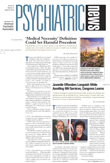Certainly genes play a causative role in autism, ample evidence has revealed. However, perinatal complications or certain variables, such as older maternal age, may also be culprits, studies of the past 30 years have suggested. Nonetheless, findings regarding perinatal complications have been inconsistent and often contradictory because of variations in sample size, data quality, control groups, and so forth.
Thus, Australian researchers decided to use centralized resources in Western Australia to conduct a large population-based study on possible perinatal factors contributing to autism. As they reported in the June Archives of General Psychiatry, they have found what previous studies have generally found—mothers of individuals with autism are more likely to have experienced difficulties during pregnancy, labor, and delivery than mothers of persons without autism.
The investigation, headed by Emma Glasson, Ph.D., a research fellow in the School of Population Health at the University of Western Australia, included 2,259 subjects—465 individuals born in Western Australia between 1980 and 1995 and diagnosed with autism spectrum disorder, 481 siblings of the autism subjects, and 1,313 controls randomly selected across the same birth years as the autism subjects.
Perinatal information collected about each of the subjects at the time of birth was retrieved from the Maternal and Child Health Research Database of Western Australia, and obstetric information for each of the three groups of subjects was then compared. In fact, as the researchers pointed out in their report, their study was “unique for incorporating the largest number of autistic cases born in a geographic region, using obstetric data collected at the time of birth, comparing cases with a large population-based control group, and comparing cases with siblings.”
Compared with the control subjects, the researchers found, autism subjects had significantly greater frequencies of threatened miscarriage, epidural caudal anesthesia use, labor induction, and a labor duration of less than one hour. They were significantly more likely to have experienced fetal distress, to have been delivered by an elective or emergency cesarean section, or to have had an Apgar score of less than 6 at one minute.
Further, autism subjects were more likely to be firstborn compared with control subjects and had significantly older parents than control subjects. In fact, older maternal age emerged as one of the strongest findings of this study, and the effect was incremental in that younger mothers had the lowest risk for having a child with autism and older mothers had the highest risk. In other words, the risk of mothers 35 years or older of having a child with autism was increased threefold compared with mothers younger than 20 years.
When data on perinatal complications for the siblings of autism subjects were examined and compared, siblings were found generally to have experienced fewer complications than autism subjects, but more than control subjects.
The researchers concluded that perinatal complications do appear to play a role in the causation of autism, although it seems that no particular factor is at fault. But how might perinatal difficulties be linked to autism? It could be by interacting with autism susceptibility genes. This possibility, in fact, could explain why siblings of autism subjects, who presumably possess some of the genes for autism but not as many as the autism subjects, have fewer obstetric complications than autism subjects, yet more than control subjects.
“The increased prevalence of obstetric complications among autism cases is most likely due to the underlying genetic factors or an interaction of these factors with the environment,” the researchers suggested.
Arch Gen Psychiatry 2004 61 618
